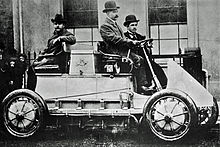The first oil crisis happened in the early 70s, almost 40 years ago. The "engineers and folks trying to make money" still haven't figure out a way yet.
I don't think you can come to that conclusion. There are just physical limits to what can be done and still provide a safe, comfortable, affordable vehicle that uses far less oil than cars did 40 years ago. ICs have their limits (Carnot Cycle), and it isn't that we have not "figured out" how to make an EV - the economics just don't make sense.
As a parallel, think back to when some really big flat screen TVs were demonstrated as an example of what could be done. The engineers "figured it out", but they didn't go into production with those units because they would have cost far more than the market could bear. That is where we are with EVs, and as we have discussed before, batteries simply can not be expected to be on the same price/performance reduction curve as pure electronics. Those chemicals have physical limits.
Public transportation does not work, car pooling does not work, small/efficient cars does not work, bike lanes does not work, concentrated living does not work, etc...
I don't think we've exhausted the possibilities. On the contrary, we've barely tapped them.
Didn't we see a several % reduction in gasoline usage when we hit $4? And yet, no big infrastructure changes happened at all, and there was no time for long term solutions to take hold. Now imagine if we all were told that gas would be that high and continually rising forever - people would make long term changes that would result in even more reductions. Not too many people are going to move closer to work immediately when gas prices jump, but over time it will be a higher priority in the job/home decision. So over time, commutes will go down, more people will request some tele-commuting days, etc. That and a million other things that just happen because people take action.
We are brainwashed to avoid diesel in spite of its higher energy density. We talk about living green but we don't practice it.
I don't have the facts/figures handy, and no time to look them up right now (maybe someone else can post them), but IIRC, the higher usage of diesel in Europe is because they had lower pollution standards than the US. So who's being 'green'?
No, Electric Vehicle (EV) is not the only solution to the problem but it's definitely the most promising one in the foreseeable future. Its main problems are battery cost, weight and longevity.
Those are big problems. And who is to say that batteries are the best solution, maybe there are alternatives. As samclem has mentioned, if we let the govt fund one area, maybe the real solution dies on the vine as it can't get support. I could give real world examples of exactly that scenario in other alternative energy areas - govt involvement stifled innovation. The guy took his technology (and jobs) to Europe - DOH!
Those problems are just too enormous/costly for a private company to solve. That's why I suggest the government involvement. And research in battery does not just benefit the EV. Laptops, cell phones, GPSs, tools, cameras and countless other electronic devices will benefit greatly with a better battery.
I would completely turn that statement around 180 degrees.
It is EVs that benefit from the pursuit of better batteries for "Laptops, cell phones, GPSs, tools, cameras and countless other electronic devices". There is already a very high amount of private investment pushing better batteries for these products. Just look at how much batteries have improved over the past 15 years. Would government involvement help that?
Think back to how so many new technologies went from expensive, large, rare, and finicky to cheap, common, small, and reliable. They (mostly) didn't get subsidies or get "pushed" into the market. At first, the expensive, large, rare, and finicky product fit a niche for someone - it made economic sense, even at that high price. Example: a solar panel and battery might make economic sense if it would be very expensive to run power to that spot. So the product fills that niche, without subsidies. Later, as further development makes the product better, there are additional niches where the product makes sense, and that keeps going until everyone has one. But not before - the subsidy would just mean we collectively pay for something that doesn't meet our needs. Bad decision.
It isn't just demand that drives product improvements. It is advancing technology that makes for improved products that creates bigger markets and that creates the demand. I don't think you can do that "artificially" (subsidies), it has to happen as technology advances, and a lot of that is just a progression that takes time and experience. There was demand for $40 VCRs when they cost $1800. But no one could make a $40 VCR until the various technologies that all work together progressed. Silicon circuits didn't just jump to their current state - they HAD to go step-wise, generation by generation to make improvements, learn how to bring yields up, and then try the next thing. No amount of money can bypass that process, and it takes time. Since there is already plenty of incentive for better batteries, more money thrown at it just isn't going to make a significant change, no matter how much you "wish" it were so.
-ERD50


 That would leave more gas for their own muscle cars.
That would leave more gas for their own muscle cars.